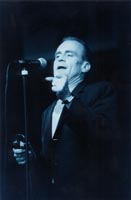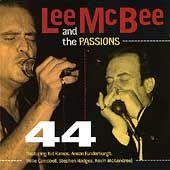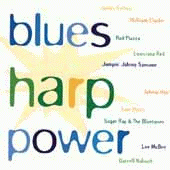 Lee McBee Lee McBee
Instrument: Vocal,
Harmonica
Plays with: Mike Morgan & The Crawl
Band name: Lee McBee & The Passions
Birthday: Marts 23, 1951, Kansas City,
Missouri
by Cathi Norton
Fri, 6 Dec 1996
Here's an interview with Lee McBee, published in the
American Harmonica Newsletter last month. Hope you enjoy it. Cathi N.
ELVIS A' LA CARTE
Lee McBee is a rounder -- I can tell you that. Born in Kansas City, MO in 1951, he was captured early on by a love of
music, and he's been a prisoner ever since. In the 1980s he struck up a partnership with Texan bluesmaker, Mike Morgan,
working as frontman/singer/harp player for Mike's band "The Crawl." Burning up the road and recording several albums
with Morgan, McBee finally felt he had to park the car. Taking time out from the relentless road life in '93, McBee
spent time on his home turf, Lawrence, KS, and put together a solo album which featured some of his favorite blues tunes
and a rodeo of guitar cowboys and blues wranglers.
McBee possesses a whiskey voice he uses to maximum advantage and a raw harp sound that lends a powerful edge to the
blues. His first solo CD, "44" (Red Hot Records, RHR 5001), is an excellent showcase of these talents. But his
partnership with Morgan worked too well to abandon for long, so they recently rejoined forces and McBee is back with his
old mistress - the road. I caught him at a pitstop to ask if there was any cure for white-line fever.
CATHI:
How did you get caught up in this crazy business?
LEE:
Oh, I've been wanting to play since I was a tiny kid. I mean since I was 4-5 years old that's been about all I thought
about -- music. I was really into Elvis when I was little. I LOVED Elvis. I used to get paid little bits of money every
now and then to sing Elvis Presley songs, like "Hound Dog," and that kinda thing.
CATHI:
You played for friends...for money?
LEE:
Well, friends of my family, you know.
CATHI:
(Laughs). Did you dress up too?
LEE:
Naw, I never did get dressed up. My mama wouldn't ever let me paint the eyebrows or the sideburns on, so I had to
just go a' la carte, you know...no dressing!
CATHI:
Elvis a' la carte! That's good! (Laughter) When did you start playing harp?
LEE:
When I was about 17 I got introduced to it by a friend who played. He was a drummer in a band, and he decided to buy
a harp and start playing it. I was listening to him and thought "Hell, I can do that!" So I gave it a shot and the first
day I was playing a couple of songs. So I thought "I might have a knack for it." Then the more serious I got the more
difficult it
became (laughs).
CATHI:
So you took that up and started playing in bands?
LEE:
Well, see I played drums in a band. I was 12 when I got in my first band; I played snare drum in it for a year and a
half -- that was a stone-country band.
CATRHI:
JUST a snare?
LEE:
Yeah (laughs).
CATHI:
How'd you get into blues?
LEE:
I had a buddy that told me about different people that played the harmonica and one of them was Paul
Butterfield...another was John Mayall. I was listening to those guys for about six months when I got introduced to
George (Harmonica) Smith.
CATHI:
Ah!
LEE:
Yeah. This guy brought a record of his. I was telling this cat that I thought John Mayall and Paul Butterfield were
the best harmonica players I'd ever heard, but especially John Mayall. This guy just looked at me, shook his head and
said: "Boy, you don't know nothin'!" "You don't know NOTHIN'!"
CATHI:
(Laughs)
LEE:
So this friend of mine took me over to his house, sat down, and played George Harmonica Smith and the blues for me.
And I was just devastated. I ain't never been the same since! (Laughter)
I could not BELIEVE it! I could nopt BELIEVE it! I just went home and threw that John Mayall record out the window!
Garbage!
CATHI:
I love it! (Laughs) So you started looking up other folks?
LEE:
Yeah, after that I got into Jimmy Reed, Slim Harpo and Little Walter -- Big Walter, Carey Bell...and Sonnyboy. I
came on with Sonnyboy most, except for George. I was a big Sonnyboy fan.
CATHI:
I don't really know much about you before you hit the Texas scene. You played in other bands?
LEE:
I played in a real variety of things. Stone country when I was little and then a couple of high school bands. I
really started doing just blues in '76 -- playing blues and nothing else. I was real into it before that, but I never
could get anybody to play it.
CATHI:
So how did the Texas connection happen?
LEE:
Well Mike (Morgan) was playing around the country, doing a bunch of touring and stuff, and his singer -- Darrell
Nulisch -- went off to play with Ronnie Earl. Mike was up here asking people if they knew of any harmonica
player-singers, and at the time there weren't that many. My name kept coming up. So he gave me a call and I was
interested so he sent me a tape. But I didn't really -- you couldn't really hear by that tape what was going on with
him.
So he went through a series of guys and then about a year after that I went and saw him play and he'd grown so much, you
know? I couldn't even fathom how good he was going to be in five years, so I said "Well, I'd better think this over!"
CATHI:
Right. So you started playing with Mike and went to Texas. Then you hit the road?
LEE:
The first week.
CATHI:
Whew. How long did you play with Mike?
LEE:
Five and a half years -- four CDs. I left two and a half years ago -- something like that -- January '93 I guess.
CATHI:
You just had enough?
LEE:
Um hm...that was about it. The road was just getting to me too much. I had to drive all the time and it was getting
the best of me.
CATHI:
So when you came home you laid back and we didn't hear much from you...until you formed "The Passions," and put out your
solo CD. Now who were the band members?

LEE:
Right. Willie Campbell, Stephen Hodges. Willie played bass and Stephen played drums. Kevin McKendree was on piano;
Anson (Funderburgh) played one guitar and Kid Ramos played the other.
CATHI:
Wow...what a lineup. I was tickled to see you out there on the scene again. Were "The Passions" a working band or
something you put together for the CD?
LEE:
There wasn't any workin' it. I did for awhile when I first put it together, but there weren't any drummers that knew
knew how to play what I wanted to play, so I just kind of put the Passions thing aside and formed a trio with me, Willie
and a fellow named Bill Dye.
CATHI:
For how long?
LEE:
That went on about a year and a half and then I got where I wanted to take off again so I went ahead and....
CATHI:
Got with Mike again?
LEE:
Yeah (laughs). I got back with Mike because I never would have left it it hadn't been for the drive -- probably. At
the time I left the band had the best personnel and personalities of any time I was ever there. We all got along
famously. That's why I knew it was nothing I could do -- it was time for me to go. I mean I wasn't stressing on how much
I didn't like these guys or that kind of thing. It was just time for me to go home for awhile. I couldn't keep on.
CATHI:
I know the feeling. Let's talk about your harp playing. You started really young and took to it. How do you think it's
progressing?
LEE:
Ooooo...as far as how much I'm learning or how much growth?
CATHI:
Yes and yes (laughter) -- I'll take both.
LEE:
Well, you learn something new every day and I'm trying to spend as much time working on the things that I play and
having better tone; a better marriage of amp, microphone and player.
CATHI:
What's your rig?
LEE:
Oh God...well the rig that I use when I play with Mike is a 1955 4-10" Bassman. I use an Astatic mic -- a JT 30-S,
and Marine Band harps. Now, the rig I used on my record was a Motorola tape recorder hooked up with a 1947 Supro, with a
'63 or '64 Astatic mic.
CATHI:
Did you like that sound?
LEE:
MAN!!! That was the best harp tone I've ever had. Well, as far as live, you couldn't get it on the record very well,
but live that thing is just AMAZING! It's AMAZING how good it sounds. It's wonderful, but you just can't get enough
volume out of it. It's real hard. I've tried it and it's just a pain in the butt (laughs). It really is -- the feedback
gets to soundin' like a kazoo..."Weee - weeeee - weeee...." (laughter).
CATHI:
(Laughs) Yeah...but there's nothing like getting the right sound though.
LEE:
Absolutely....absolutely!
CATHI:
You use Marine Band harps?
LEE:
When I can get good ones.
CATHI:
I heard they aren't always even in quality. Do you doctor 'em up?
LEE:
Well, sometimes I mess with'em, but I don't fix 'em if they ain't broke.
CATHI:
(Laughs) Good idea. Have you tried the Filisko harps?
LEE:
No...but I'm getting ready to. I've heard a lot about 'em.
CATHI:
Let's talk about your vocals...which I VERY much dig. Did you have a background with soul and gospel?
LEE:
Thank you very much! Yeah,...sang in church and you know, I sang all the time -- every day. I didn't have a whole lot of
soul background other than top-40 radio stuff. I really liked all of that stuff. But after we moved (back) to Kansas
City, my mother started hanging out and working in country bars. I'd say that during my most impressive years -- my
youth -- I spent time listening to country and western music. And it stuck with me. I mean, in some respects it's one of
my favorite types...if it isn't THE favorite, it's right up there!
CATHI:
That's really interesting when your main gig is blues you know? Do you think that affects your sound?
LEE:
Well singing, I think, more than harmonica playing. There's not that many country harp players I idolize like I
idolized a lot of the singers. You know, like Patsy Cline and George Jones, Del Reeves and Webb Pierce. It's just
remarkable how good those old guys were.
CATHI:
Do you think those two styles (blues and country) came out of each other in any way?
LEE:
Well, you know there's a guy that did both that is considered the father of country music and that's Jimmy Rogers. I
mean he could play Delta blues.... And there's a guy out in Washington, D.C. -- John Jackson. He told me he didn't even
know Jimmy Rogers was white the first ten years he was listening to him! He didn't have a clue! (Laughs). Cause he just
played the blues stuff, and he's like THE guy for country music.
CATHI:
Do you still wear rhinestones on your jacket Lee? (Laughs)
LEE:
Nawwwww...I don't do that, but I do still wear cowboy boots. I think a lot of those old cowboy suits...I know that.
I loved them. Those suits are sooooo cooool!
CATHI:
So what's up with Mike and the band now?
LEE:
Well, we're doing real good. I'm trying to get the songs re learned and learn all the new ones.
CATHI:
Are you doing some writing?
LEE:
Yeah, I've got a couple we'll probably put on the next record and if we don't have space, I'll do it on my second
solo record, which will have more originals than this one did. One of the only complaints I got about my solo CD was
they wanted more of my originals.
CATHI:
So you're planning to continue to develop your solo thing in addition to Mike Morgan and the Crawl? Was that the purpose
of the solo album -- to maybe get you out a little bit more in front?
LEE:
Umm Hmmm. You know, just do something without Mike. All the recordings I've done have been with him, so I thought it
would be nice to do something solo, and since I was home and people were waving their money around under my
nose...(laughs).
CATHI:
All right! Plus you got some very cool players to come in.
LEE:
Yeah! I was lucky with that -- God, that fell into place really good!
CATHI:
Who plays in the Crawl? You and Mike...
LEE:
You and....(Laughs).... You -- don't you know? He told me to call you (laughter).... Mike (guitar) and Mark Wilson
(drums), and a kid named Johnny Bradley from Battle Creek, MI -- nice kid - good upright bass player. It's really nice
playing with these guys. I mean we all know each other. And you know Johnny is the newest guy and not as familiar with
the three of us, but I know he'll get it fine. It's going to take a little time, too, just for everybody to get used to
me coming back.
CATHI:
So are you sharing lead chores with Mike on guitar and you on harp?
LEE:
Mike carries most of it on guitar. There's a number of songs that I just sing on. When I initially joined the band, that
was my main job -- singing, and the harp was second. But harmonica players really need to sing. It helps you work.
CATHI:
Do you have touring plans in the works again? I know you just came down off the road this week. How do you like being
back on it?
LEE:
Yeah, looks like next week it's New Orleans. We're (Lee and wife) getting re-used to it. This last month's been kind of
hard.
CATHI:
It's always hard for me -- you don't find your own stuff when you open a drawer.
LEE:
Yeah, it's a drag. I just leave everything in my suitcase and pretend it's the drawers. That way everything looks
familiar.
CATHI:
A mess huh? (Laughs) It's hard to find a decent vegetable on the road -- I can tell you that.
LEE:
I KNOW that's right!! I just go to the grocery stores and buy bags of raw vegetables and eat 'em. Sometimes you just
gotta break down and do it.
CATHI:
I hear you. It's like going to war in a way -- hard to get rest; hard to get good food; you can't sleep....
 LEE: LEE:
Yeah...yeah...I take my own pillow.
CATHI:
Whatever works...you get used to what you gotta have...a' la carte.
LEE:
(Laughter)
source: http://www.garply.com/harp-l/archives/ - no longer existing
 |